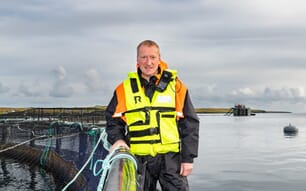Ms Truss met with Scottish mackerel fishermen during a visit to Peterhead on 15 August and pledged her full support for the industry.
Ms Truss commented: "This ban is totally unjustified and I share the concerns of Scotland’s fishing industry about the possible impact on their business.
"I want Scotland’s fishermen to be assured the UK government stands ready to support them throughout these sanctions.
"We will continue to use our clout to lobby hard in Brussels on behalf of Scotland’s world-class fishing industry."
Vice-President of the Scottish Fishermen’s Federation, Ross Dougal, was also present at the meeting. Mr Dougal said the fishermen were delighted that Ms Truss took the time for this important fact finding visit.
“She listened carefully to a wide range of industry concerns – in particular the impact the forthcoming discards ban will have on our whitefish, prawn and pelagic fishermen, and the need for there to be a sensible and practicable management regime that shows great flexibility and doesn’t threaten the future viability of our fishing fleets.
“She also heard of our real fears over the impact of Russian retaliatory sanctions on mackerel fishermen and processors, and the importance of support measures to help the sector through this difficult period.
"We welcome that the Secretary of State recognised these concerns, and that the UK Government is working with the Scottish Government towards implementing measures to alleviate their impact.”
Speaking after the meeting, Scotland’s Cabinet Secretary for Rural Affairs, Food and the Environment Richard Lochhead said he was pleased to have the opportunity to meet with Ms Truss.
"We had a constructive meeting and discussed the impact of the Russia trade embargo on Scotland's mackerel fleet and processors and ways we can help them deal with the immediate and longer term challenge the ban presents.
"In particular I highlighted it would be helpful for the UK to look at export insurance to help the industry with exports to Ukraine and to explore with the EU possible opportunities around banking of quota - as well of course as exploring new markets and increasing domestic demand with consumers and retailers. All of which were areas targeted by the five-point plan I agreed with the industry in Edinburgh earlier this week.
"This is a really successful sector, used to dealing with changing market conditions and there are lots of avenues for us to explore. So the most important thing is that we are fleet of foot and I look forward to pursuing all the options over the coming weeks," Mr Lochhead concluded.
The UK government is currently working with the Scottish government, European Commission and the industry to open up lucrative new fish markets to help businesses increase their international trade.
As part of the UK government’s approach Defra will:
- work hard to open up new markets and increase access to existing markets for high quality British mackerel, especially in the Far East and West Africa;
- work with the fishing industry to manage supplies of mackerel this coming fishing season (October to March) to help keep prices stable;
- look with the Scottish government at what support can be provided to meet the cost to fishermen of storing frozen mackerel while alternative markets are sought; and
- call on the EC to consider the merits of any potential World Trade Organisation case to ensure the rules of international trade are upheld.



